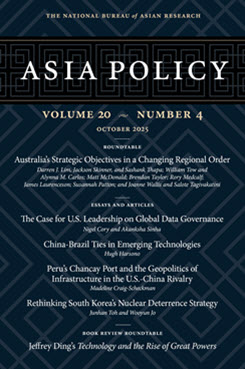Essay in Asia Policy 20.4
China-Brazil Ties in Emerging Technologies
Innovation, Opportunity, and the Challenge of Digital Sovereignty
This essay examines the deepening technological relationship between China and Brazil, focusing on key emerging sectors such 5G, cloud services, blockchain, and renewable energy.
EXECUTIVE SUMMARY
MAIN ARGUMENT
Brazil possesses both the largest economy and population in South America, and, with an openness to innovation, it represents an appealing testing ground and growth market for new technologies. Brazil’s digital transformation is increasingly underpinned by Chinese technologies. Owing to China’s extensive strategic financial, infrastructure, and digital investments in the country, alongside a variety of collaborative initiatives, Brazil’s technological development reflects China’s emerging strategic influence in Latin America. While these partnerships have enabled rapid modernization in Brazil, they risk undermining long-term digital sovereignty and creating new forms of dependency in critical infrastructure sectors.
POLICY IMPLICATIONS
- Brazil should prioritize strengthening its domestic research and development capabilities, particularly in strategic sectors such as information and communications technology, blockchain, and renewable energy. This will foster innovation, reduce reliance on foreign technologies, and help protect national security interests by safeguarding critical data and infrastructure.
- To mitigate overdependence on China, Brazil must diversify its technological partnerships globally by expanding cooperation with other countries.
- Brazil must implement clear and robust regulatory frameworks to manage foreign investment in its technology sector in order to ensure alignment with national security priorities, long-term development goals, and a balance of foreign involvement.
Hugh Harsono is a current participant in the Atlantic Council’s Millennium Leadership Program (United States). He works at the intersection of strategy, innovation, product management, and product policy, focusing on the broad influence of emerging technologies on international security, technology policy, and strategic competition. Previously, Mr. Harsono worked for Ripple, where he pilot‑tested and helped roll out central bank digital currency solutions, and the Lawrence Livermore National Laboratory’s Center for Global Security Research, where he focused on the strategic implications of blockchain. His commentary and analysis have appeared in TechCrunch, the South China Morning Post, the Diplomat, and Nikkei Asia. Mr. Harsono received his graduate and undergraduate degrees from the University of California, Berkeley.
About Asia Policy
Asia Policy is a peer-reviewed scholarly journal presenting policy-relevant academic research on the Asia-Pacific that draws clear and concise conclusions useful to today’s policymakers. Asia Policy is published quarterly in January, April, July, and October and accepts submissions on a rolling basis. Learn more


